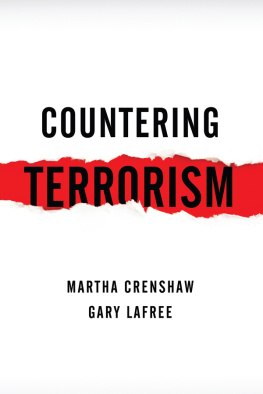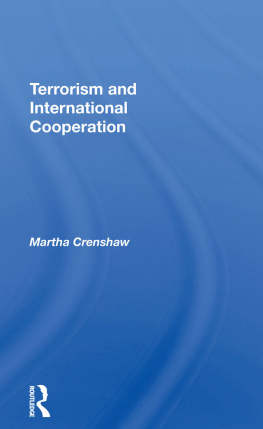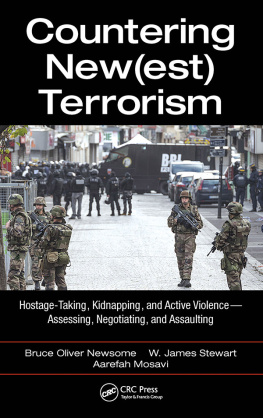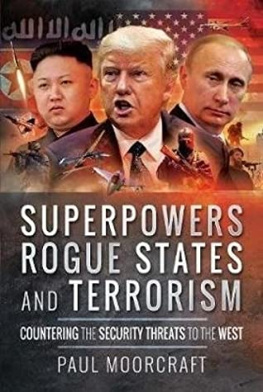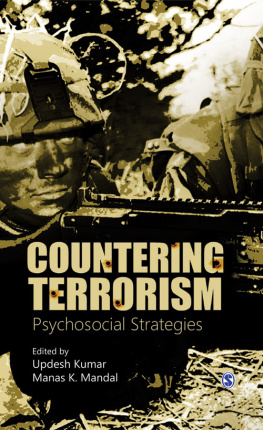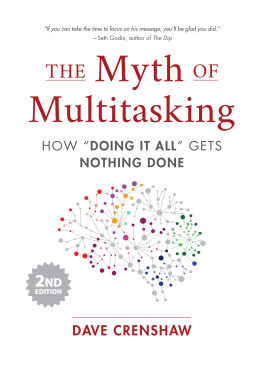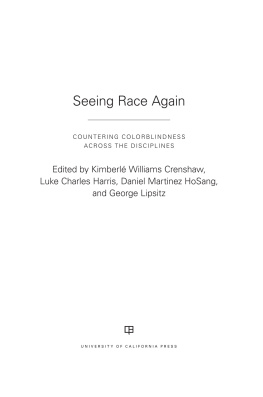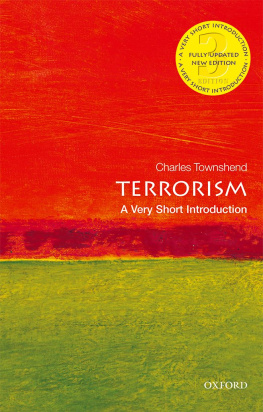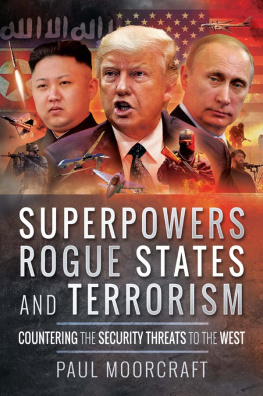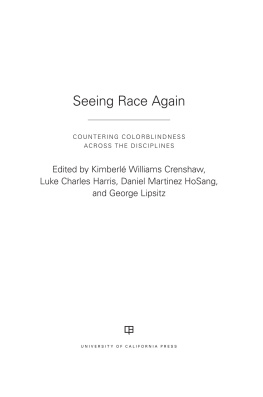Countering Terrorism
Martha Crenshaw
Gary LaFree
BROOKINGS INSTITUTION PRESS
Washington, D.C.
Copyright 2017
THE BROOKINGS INSTITUTION
1775 Massachusetts Avenue, N.W., Washington, D.C. 20036
www.brookings.edu
All rights reserved. No part of this publication may be reproduced or transmitted in any form or by any means without permission in writing from the Brookings Institution Press.
The Brookings Institution is a private nonprofit organization devoted to research, education, and publication on important issues of domestic and foreign policy. Its principal purpose is to bring the highest quality independent research and analysis to bear on current and emerging policy problems. Interpretations or conclusions in Brookings publications should be understood to be solely those of the authors.
Library of Congress Cataloging-in-Publication data are available.
ISBN 978-0-8157-2764-4 (pbk : alk. paper)
ISBN 978-0-8157-2765-1 (ebook)
9 8 7 6 5 4 3 2 1
Typeset in Sabon LT Std
Composition by Westchester Publishing Services
Contents
Preface
The two of us first met at a conference in 2003 and a year later helped create the National Consortium for the Study of Terrorism and Responses to Terrorism (START), a center dedicated to understanding the human causes and consequences of terrorism. We found that our connections to the study of terrorism were at once distinctive and complementary: Martha Crenshaw is a political scientist with a long track record in the study of terrorism, while Gary LaFree is a criminologist whose interest in terrorism studies is more recent and connected to general interests in collecting and analyzing historical data on criminal violence. As research on the Global Terrorism Database (GTD) matured, LaFree began thinking that it would make sense to write a general book about some of the policy lessons illustrated by the GTD. So in 2010 he approached Crenshaw with broad ideas about a policy-oriented book. She agreed to collaborate, and we began to develop the outline. From the beginning we focused on explaining why it is inherently difficult for the American government to formulate an effective counterterrorism policy. We also argued that terrorism researchers face many of the same difficulties in explaining terrorism and counterterrorism.
Over the years of work on this book, the drumbeat of terrorist threats has become even louder than it was when we first began the project. While neither of us thinks that the scourge of terrorism is going to be eliminated anytime soon, we also believe that now more than ever it is imperative to make sensible and moderate policy decisions based on a realistic appraisal of the threat.
We would first like to acknowledge the support of our respective home institutions: the University of Maryland, particularly the National Consortium for the Study of Terrorism and Responses to Terrorism (START), and Stanford University, particularly the Center for International Security and Cooperation (CISAC) and the Freeman Spogli Institute for International Studies (FSI).
Parts of the arguments developed in this book were supported by the Global Terrorism Database, which is funded by the Office of University Programs at the U.S. Department of Homeland Security and by the Bureau of Counterterrorism at the U.S. Department of State. We appreciate that our funders have steadfastly preserved our academic freedom, and the views expressed in this book are entirely our own. Margaret Wilson and Erik Dahl were members of the START research group that developed the dataset we relied on in .
We especially want to express our appreciation for the supremely helpful comments offered at different points during the lengthy process of writing this book by the following individuals: Anja Dalgaard-Nielsen, Betsy Cooper, Morgan Kaplan, Terence Peterson, Shiri Krebs, Kate Cronin-Furman, Mark Jacobsen, William Spaniel, Itay Ravid, Erin Miller, and Alexa Andaya. Parts of the book were presented at CISACs weekly Social Science Seminar, and we are grateful for the feedback from the participants. CISAC also generously hosted a murder board at Stanford for a critique of the completed manuscript, and we are in debt to our friends and colleagues Kim Cragin, Michael Stohl, Michael Kenney, Joe Felter, Lynn Eden, and Arif Alikhan for reading and responding to our work in its entirety. The two anonymous Brookings reviewers were clearly experts whose comments were constructive as well as critical. Itay Ravid, Scott Bade, Alexa Andaya, Aubrey Blanche, Kerry Persen, Kathryn Holleb, Bo Jiang, Mike Jensen, Mike Distler, and Scott Menner provided indispensable research support and administrative assistance. Bill Finan has been an encouraging and motivating editor, and it was a great pleasure to work with him as well as the excellent editing staff at Brookings.
On a personal note, we thank our spouses, Richard W. Boyd and Vicki Viramontes-LaFree, respectively, for their patience and forbearance.
Martha Crenshaw
STANFORD
Gary LaFree
MARYLAND
CHAPTER 1
Introduction
The Context for Analyzing Counterterrorism DifficultiesCurrent Threats and the State of Academic Research
What is it about terrorism that makes it such a challenging policy problem? The purpose of this book is to explain the characteristics of terrorism that make it inherently difficult for governments, especially the U.S. government, to formulate effective counterterrorism policies. Why is terrorism so intractable? What are the obstacles to developing a consistent and coherent counterterrorism strategy? The barriers that we identify flow from the issue itself, not the particular political predispositions of individual policymakers or flawed organizational processes. We find that scholars and policymakers face similar difficultiesthe study of terrorism is often confused and contentious, and the study of counterterrorism can be even more frustrating.
Our main thesis in this book is that the conceptual and empirical requirements of defining, classifying, explaining, and responding to terrorist attacks are more complex than is usually acknowledged by politicians and academics, which complicates the task of crafting effective counterterrorism policy. Although the policymaking process, the goals of individual American leaders, and American societal and political pressures are relevant factors, our focus is on the daunting complexity, variation, and mutability of the issue itself. Moreover, the stakes are especially high since the consequences of missteps and miscalculations in responding to terrorism are potentially catastrophic. In the chapters that follow we outline some of the barriers to recognizing and responding to terrorist attacks and suggest ways to overcome the obstacles we identify. Terrorist attacks are rare, yet they encourage immediate and far-reaching responses that are not easily rolled back. Most attempts actually fail or are foiled, so that examining only successful terrorist attacks gives an incomplete picture. The actors behind terrorism are extremely difficult to identify, since there is no standard terrorist organization. Governments and researchers often struggle to establish responsibility for specific attacks. Evaluating the effectiveness of counterterrorism is problematic. For empirical comparisons we rely to a large extent on the nearly 157,000 terrorist attacks that have occurred around the world over the past four and a half decades since 1970; they are catalogued by the Global Terrorism Database (GTD), maintained at the University of Maryland.
Following this introduction, in we argue that the atypicality of terrorist attacks makes them difficult to study and predict and, consequently, to prepare for and counter. We examine the frequency of terrorist attacks worldwide and against Americans at home and abroad, and we demonstrate that terrorist attacks, especially those with mass casualties, are exceedingly rare, however ubiquitous they might appear. Nevertheless, the U.S. government responded to 9/11 as though it presaged the beginning of a trend. The transformative policies and institutional reorganizations adopted in the immediate aftermath of 9/11 have reshaped international and domestic security politics. It has not been easy to roll back changes made in the moment of crisis in order to adapt to a shifting threat. Democratic governments may not be capable of treating rare but highly destructive terrorist events as outliers rather than regularities.

